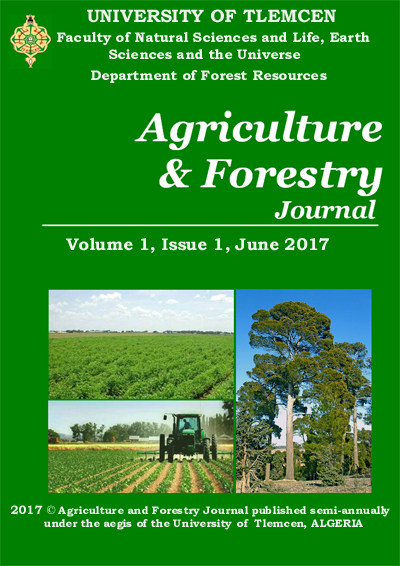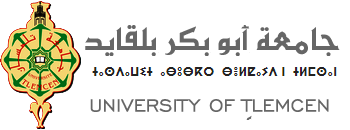Study of the variability of the parameters, characteristics of the cork according to the extraction height
DOI:
https://doi.org/10.46325/afj.v8i2.176Keywords:
Cork, parameters, height, barrel, extractionAbstract
In the Hafir cork grove, 60 sample trees close to the stripping were obtained 180 cork calas, extracted according to three heights of the trunk and three levels of the ground. On these samples the main characteristic parameters of cork were studied, namely the size, surface density, volume density, porosity, appearance and quality indices. The results revealed that reducing the caliber of the base of the barrel (H1 = 60 cm (32.30mm)) to its height (H3: 230cm (24.70mm)) potentially influences the other parameters. The surface density goes from 7.64 kg/m2 to 5.41 kg/m2; the volume density increases from 256.46 kg/m3 to 288.43 kg/m3; the porosity of 8.21% drops to 3.38%; the appearance of class 6a stabilizes at class 1a -4a, and finally the quality indices (IQ) improve further from 5.80 to 12.5. These results confirm the need to set the height of cork debarking to obtain the best yield without harming the vigor of the tree.
References
APCOR.,2015. Anuário 2015,p.100. Retrieved from http://www.apcor.pt/wp-content/uploads/2015/07 /Estudo_ CaraterizacaoSectorial_2015.pdf
APCOR.,2016. Anuário 2016, p. 104. Retrieved from https://www.apcor.pt/portfolio-posts/anuario-2016-do-setor-da-cortica-ja-disponivel
Dasilva M.E.C.M., 2010. A cortiça - suas características e propriedades. UTAD. 33p.
Dehane B., 2012. Incidence de l’état sanitaire du chêne liège sur les accroissements annuels et la qualité du liège de deux subéraies oranaises: M’Sila (w. Oran) et Zarieffet (w. Tlemcen). Thèse de Doctorat en Foresterie, Université deTlemcen, 293 p.
Díaz-Villa M. D., Marañón T., Arroyo J. and Garrido B. 2003. Soil seed bank and floristic diversity in a forest-grassland mosaic in Southern Spain. Journal of Vegetation Science, 14(5):701-709
F.A.O., 2013. État des forêts Méditerranéennes 2013. Plan Bleu, Marseille, 363p.
F.A.O., 2018. État des forêts Méditerranéennes 2018. Plan Bleu, Marseille, 363p.
F.F.L., 2020. L'utilisation du liège est un avantage pour l'environnement : https://planeteliege.com/tout-sur-le-liege/lutilisation-du-liege-est-un-avantage-pour-lenvironnement. Accessed in December 2023.
Ferreira A. Lopes F. & Pereira H. 2000. Caractérisation de la croissance et de la qualité du liège dans une région de production. Annales des Sciences Forestières, 57: 187-193.
González Montero J.A., 2004a. Estimación de la calidad de corcho en el árbol. Revista Foresta, (2) 27: 157-164.
González Montero J.A., 2004b. Variación de la producción de corcho en cantidad y calidad en la comunidad de Extremadura [Variation of cork production in quantity and quality in the region of Extremadura ](In.), Polytechnic University of Madrid.
IPROCOR., 2006. Estimación de la calidad del corcho en árbol. Instituto del Corcho, la Madera y el CarbónVegetal, 13p.
Lamey A., 1893. Chêne liège : sa culture et son exploitation. Levrault et Cie, Nancy :168 - 209
Montero G., 1987. Produccion y regeneracion de los alcornocales. Montes, 15: 37-45.
Monterro G. and Canellas I., 2003. Selvicultura de los Alcornocales en España. Silva Lusitana, 11(1): 1-19.
Natividade V.J., 1956. Subericulture. Ecole national des eaux et des forêts. Nancy,281p.
Pereira H., 200. Cork: Biology, Production and Uses. Elsevier. Ed.Oxford. UK.329p.
Saccardy L., 1937. Notes sur le chêne liège et le liège en Algérie. Bull. de la Science
Sampaio A., 1988. Le liège « Production, mise en valeur, transformation et commercialisation ». Forêt Méditerranéenne, 10(1): 156 -190.
Downloads
Published
How to Cite
Issue
Section
License

This work is licensed under a Creative Commons Attribution-NonCommercial 4.0 International License.









